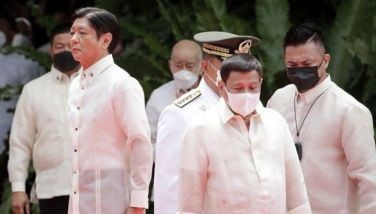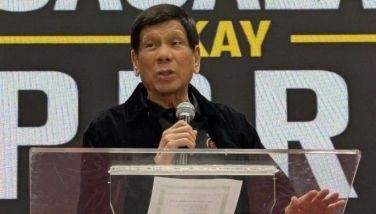GMA: Amnesty will lead to reconciliation

December 19, 2003 | 12:00am
President Arroyo’s proposed general amnesty grant to rebels and other political offenders is in line with her administration’s desire to achieve "genuine reconciliation" and unite a deeply divided Filipino nation.
"I believe in genuine reconciliation as our way to the future," the President said in an official statement issued yesterday.
"I am striving to find a sound legal basis for genuine reconciliation and I welcome the views of others who would want to join us to unify our people and ensure a brighter future for our nation," Mrs. Arroyo said.
Senate President Franklin Drilon, however, cautioned that the amnesty program cannot cover graft and corruption cases such as those involving jailed President Joseph Estrada.
"A general amnesty grant can cover only political crimes, or those committed in the pursuit of a political objective. It would be improper to include crimes like plunder, which involves graft and corruption in the proposed amnesty," Drilon emphasized.
Drilon, a former justice secretary and once a member of the National Amnesty Commission (NAC), said though that he will support amnesty for political offenders.
"The coverage of the law shall not be limited to organized rebel groups, but shall also include individual participants of political strife," he said.
Under the Palace draft copy of the amnesty grant — tentatively called the "National Healing and Reconciliation Act of 2003" — amnesty will be given to various rebel groups as well as individuals and other groups which had "political clashes" with the Arroyo administration.
The bill seeks to create the five-member National Healing and Reconciliation Commission (NHRC) which would be empowered, among other things, to implement the grant of amnesty to those involved in past political conflicts.
Mrs. Arroyo, however, clarified that it would be up to Congress to determine whether this general amnesty grant would also be extended to the Marcoses and their cronies, the loyal Estrada supporters who stormed Malacañang in May 2001 and the military rebels who launched the failed July 27 mutiny against her administration.
"Principled reconciliation with justice can be attained if all sides open their hearts to it," Mrs. Arroyo pointed out.
"We cannot move forward if we do not resolve this basic dilemma in our political life. Our future rests on a fully reconciled Filipino nation and society," she added.
Former education secretary and presidential aspirant Raul Roco strongly opposed the President’s move, saying it is "unethical and unconstitutional."
"Is the proposed amnesty for Jose Velarde or Jose Pidal? Mrs. Arroyo is sacrificing justice at the altar of politics," Roco said. "It is a betrayal of her oath to preserve and defend the Constitution, execute the law and do justice to every man."
For his part, Sen. Sergio Osmeña III said Mrs. Arroyo is merely resorting to "political gimmickry" when she proposed the general amnesty for her political foes. He described it as a "short cut in the implementation of the criminal justice system."— With Jose Rodel Clapano, Sheila Crisostomo
"I believe in genuine reconciliation as our way to the future," the President said in an official statement issued yesterday.
"I am striving to find a sound legal basis for genuine reconciliation and I welcome the views of others who would want to join us to unify our people and ensure a brighter future for our nation," Mrs. Arroyo said.
Senate President Franklin Drilon, however, cautioned that the amnesty program cannot cover graft and corruption cases such as those involving jailed President Joseph Estrada.
"A general amnesty grant can cover only political crimes, or those committed in the pursuit of a political objective. It would be improper to include crimes like plunder, which involves graft and corruption in the proposed amnesty," Drilon emphasized.
Drilon, a former justice secretary and once a member of the National Amnesty Commission (NAC), said though that he will support amnesty for political offenders.
"The coverage of the law shall not be limited to organized rebel groups, but shall also include individual participants of political strife," he said.
Under the Palace draft copy of the amnesty grant — tentatively called the "National Healing and Reconciliation Act of 2003" — amnesty will be given to various rebel groups as well as individuals and other groups which had "political clashes" with the Arroyo administration.
The bill seeks to create the five-member National Healing and Reconciliation Commission (NHRC) which would be empowered, among other things, to implement the grant of amnesty to those involved in past political conflicts.
Mrs. Arroyo, however, clarified that it would be up to Congress to determine whether this general amnesty grant would also be extended to the Marcoses and their cronies, the loyal Estrada supporters who stormed Malacañang in May 2001 and the military rebels who launched the failed July 27 mutiny against her administration.
"Principled reconciliation with justice can be attained if all sides open their hearts to it," Mrs. Arroyo pointed out.
"We cannot move forward if we do not resolve this basic dilemma in our political life. Our future rests on a fully reconciled Filipino nation and society," she added.
Former education secretary and presidential aspirant Raul Roco strongly opposed the President’s move, saying it is "unethical and unconstitutional."
"Is the proposed amnesty for Jose Velarde or Jose Pidal? Mrs. Arroyo is sacrificing justice at the altar of politics," Roco said. "It is a betrayal of her oath to preserve and defend the Constitution, execute the law and do justice to every man."
For his part, Sen. Sergio Osmeña III said Mrs. Arroyo is merely resorting to "political gimmickry" when she proposed the general amnesty for her political foes. He described it as a "short cut in the implementation of the criminal justice system."— With Jose Rodel Clapano, Sheila Crisostomo
BrandSpace Articles
<
>
- Latest
- Trending
Trending
Latest
Trending
Latest
Recommended



























